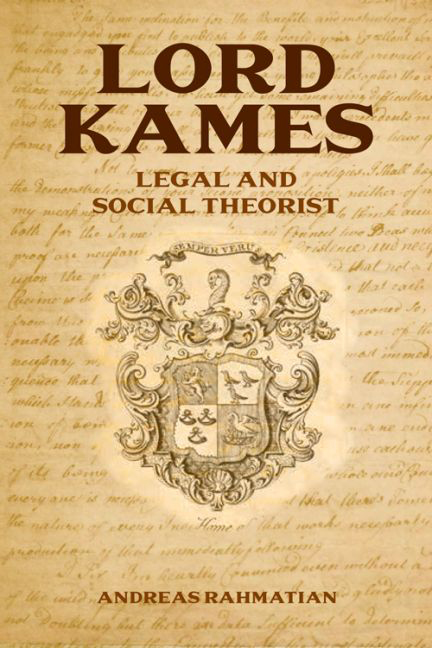Book contents
- Frontmatter
- Contents
- Preface
- Bibliography of Works by Lord Kames and Abbreviated References
- I Introduction
- II Aesthetics
- III Moral Philosophy I: Principles
- IV Moral Philosophy II: Development
- V Political Philosophy, Anthropology and Commerce
- VI Legal History, Legal Science and Comparative Law
- VII Property
- VIII Equity
- IX Obligations and Enforcement
- X Criminal Law
- XI Lord Kames's Influence on Some of the Founders of the United States
- XII A Critical Conclusion
- Bibliography
- Index
- Frontmatter
- Contents
- Preface
- Bibliography of Works by Lord Kames and Abbreviated References
- I Introduction
- II Aesthetics
- III Moral Philosophy I: Principles
- IV Moral Philosophy II: Development
- V Political Philosophy, Anthropology and Commerce
- VI Legal History, Legal Science and Comparative Law
- VII Property
- VIII Equity
- IX Obligations and Enforcement
- X Criminal Law
- XI Lord Kames's Influence on Some of the Founders of the United States
- XII A Critical Conclusion
- Bibliography
- Index
Summary
Aesthetics as the Prolegomena to Kames's Moral Philosophy, and Legal and Social Theories
When Kames wrote the Elements of Criticism, his legal background will have been of some assistance when he planned the logical organisation of his work. It was not unusual in the eighteenth century that someone with a legal training would write a critical theory of the arts to provide a scientific framework for their understanding, analysis and appreciation. There were authors of aesthetic theory with a legal background as well as artists who had a legal and/or philosophical training, although the latter group often prepared more practical textbooks on art creation. What is exceptional is that the Elements of Criticism were composed by someone who practised law throughout his whole life, and perhaps because of that, the aesthetic concepts in this work are not only closely interrelated with moral philosophy, but are also relevant to concepts of law. The Elements of Criticism is a central treatise within Kames's oeuvre and it is therefore appropriate to introduce Kames's legal and social theories with his ideas about aesthetics.
The Elements of Criticism seeks to present systematically a comprehensive critical theory of the arts (in fact mostly of literature), based on the moral philosophy and aesthetics of the time. The work is in the tradition of Shaftesbury and Hutcheson, and is influenced by Hume. There is no evidence that Kames was familiar with Burke's Origin of our Ideas of the Sublime and Beautiful (1756). In Kames's words the book wants to provide ‘a foundation for reasoning upon the taste of any individual, and for passing sentence upon it’, so to turn ‘criticism into a regular science’. Although systematically structured, it is by no means always lucid in its organisation and often quite peculiar in its choice of themes and their exposition. David Hume called the work ‘too abstruse and crabbed ever to take with the Public’, but it proved surprisingly successful, particularly in Germany and the United States.
- Type
- Chapter
- Information
- Lord KamesLegal and Social Theorist, pp. 20 - 35Publisher: Edinburgh University PressPrint publication year: 2015



